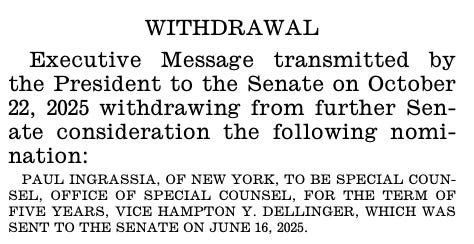Four Republican Rebukes of Trump
The GOP’s quiet breaks with the president.
Good morning, everyone! We’ll be running a Q&A column later this week, so this is your chance to send in questions! As always, you can drop questions in the comments or simply by filling out this form, which is anonymous and doesn’t require you to use the Substack app. Looking forward to seeing your questions!
Regular readers know that I’m fascinated by the Republican Party’s constantly evolving relationship with Donald Trump: the times they loyally fall in line behind him, the times (often without much public notice) that they don’t, and what drives which path they take for any given issue.
This morning, let’s take a look at four notable times in the last 24 hours that Republicans have broken with Trump, either because of ideological differences (#1), concern for powerful interests in their states (#2) or broader coalition (#3), or attention to their own political futures (#4):
1. Brazil tariffs. Many of President Trump’s tariffs have been imposed through the International Emergency Economic Powers Act of 1977, which allows the president to take certain economic actions as long as he’s declared a national emergency under the National Emergencies Act of 1976.
The National Emergencies Act includes a provision that allows Congress to overturn one of these national emergencies, however, and a process to fast-track resolutions that do so. (These resolutions can still be vetoed by the president, so they aren’t always successful, but they make for notable indicators of where Congress stands. If one were to be approved with a veto-proof majority, however, it would be a way that Congress could end Trump’s import taxes, since a given tariff can’t survive without the national emergency that it relies on.)
Earlier this year, the Senate voted 51-48 to end the national emergency that initiated Trump’s tariffs on Canada. Yesterday, the Republican-controlled chamber pushed back on Trump’s import taxes again, voting 52-48 to end the national emergency that allowed for Trump’s 50% tariffs on Brazil. (The national emergency was partially declared in response to Brazil’s prosecution of its former president Jair Bolsonaro, a Trump ally.) Five Republican senators — Susan Collins (ME), Mitch McConnell (KY), Lisa Murkowski (AK), Rand Paul (KY), and Thom Tillis (NC) — joined all 47 Democrats in voting to terminate the emergency.
In addition to facing a veto threat from Trump if it ever reached his desk, the resolution is unlikely to advance that far due to a parliamentary maneuver taken by the House in September to turn off the fast-track procedure for a resolution overturning the Brazil emergency at least until March. (House Republicans have made similar moves throughout the year with respect to other national emergencies.)
So, this is probably the end of the road for this particular resolution. But the five Republican defections on yesterday’s vote still make for a notable rebuke, coming from a Senate GOP that rarely makes such public breaks with the president. It’s also possible that the resolution could see a second life in a Supreme Court opinion one day.
In preparation for next week’s Supreme Court arguments over Trump’s tariff powers, I think it’s worth revisiting the court’s 2023 opinion on Joe Biden’s attempt to cancel student loan debt, the last time a president attempted to assert sweeping power over the economy and the court said, “Um, that’s an area in Congress’ wheelhouse, not yours.” Here’s an excerpt from the opinion:
[I]magine instead asking the enacting Congress a more pertinent question: “Can the Secretary use his powers to abolish $430 billion in student loans, completely canceling loan balances for 20 million borrowers, as a pandemic winds down to its end?” We can’t believe the answer would be yes. Congress did not unanimously pass the HEROES Act with such power in mind.
(The HEROES Act is the law that Biden claimed gave him the authority to cancel student loan debt, much like Trump now claims that the International Emergency Economic Powers Act gives him the power to impose tariffs, even though neither statute says so explicitly.)
As evidence for the fact that it was unlikely that Congress intended to give the president such broad powers, the Supreme Court noted that the executive branch was claiming the ability to implement a program “that Congress has chosen not to enact itself.” Congress is “not unaware of the challenges facing student borrowers,” Chief Justice John Roberts wrote; bills had been introduced to achieve Biden’s aim, but they all “failed to reach a vote.”
Similarly, one could imagine this vote on Trump’s tariffs being used as evidence that Congress is not on board with the president’s trade agenda, which he is claiming to have enacted with a (decades-old) legislative blessing. The Senate is also set to vote this week on a resolution overturning the national emergency that undergirds Trump’s worldwide “reciprocal” tariffs, which are also at issue in next week’s court case.
2. On the topic of South America… Vice President JD Vance attended the Senate GOP’s weekly lunch yesterday, in an attempt to urge Republicans to vote to uphold Trump’s tariffs, which was obviously a mixed success.
While he was there, Senate Republicans appear to have barraged Vance with concerns about another beef of theirs: beef.
More specifically, they are upset about Trump’s plan to quadruple the amount of beef that Argentina will be able to import into the U.S. at a lower tariff level — a move that the administration hopes will lower soaring beef prices, helping consumers … but hurting American beef producers, who benefit from higher prices.
Republicans in cattle-producing states have fiercely criticized the proposal both publicly and privately, urging the president to reverse course. So far, he’s refused, writing in a recent Truth Social post that cattle ranchers “don’t understand” the issue.
Yesterday, they took their case to Vance directly: according to Punchbowl News, at least a half-dozen GOP senators “bombarded” the VP with questions on the beef imports, until he eventually joked, “Does anyone have questions not about beef?” Sen. Steve Daines (R-MT) acknowledged to the New York Times that the VP received “an earful” on the matter.
“It amounted to an uncommon protest from G.O.P. lawmakers who have largely deferred to President Trump in his second term on most matters both foreign and domestic,” the Times reported.
3. Even more withdrawals. Last week, I reported that President Trump had withdrawn more nominees in 2025 than any president in a single year in at least the last four decades. At the time, Trump’s withdrawal count had reached 48. The next-closest year in recent history was 2008, when George W. Bush withdrew 35 nominees.
And, as I noted, the year wasn’t over yet: there was still time for Trump to keep running up his record. Indeed, just in the last eight days since I published that newsletter, Trump’s count has gone up to 52.
One of the additional withdrawals was well-documented: Trump pulled Paul Ingrassia’s bid to become head of the Office of Special Counsel, after several Senate Republicans announced they would oppose his nomination due to leaked texts in which he said he had a “Nazi streak.”
It is unclear why two of the newest withdrawals (Defense Department nominee Jeffrey Bornstein and Education Department nominee Kevin O’Farrell) pulled their nominations. However, the fourth — Joel Rayburn, who was nominated to be Assistant Secretary of State for Near Eastern Affairs — was reportedly withdrawn, like Ingrassia, because “he did not have the votes.”
Rayburn particularly faced opposition from Sen. Rand Paul (R-KY), who grilled him at his confirmation hearing about his ties to an incident from the first Trump administration when a State Department official (who Rayburn served under) admitted that he misled administration higher-ups about the number of U.S. troops on the ground in Syria, in an attempt to discourage Trump from removing troops there. If his nomination had advanced, Rayburn would have been in charge of Middle East policy at the State Department.
And that’s not all: Withdrawal #53 is likely imminent. Amer Ghalib is the socially conservative Democratic mayor of Hamtramck, Michigan, who generated headlines in 2024 when he endorsed Trump’s presidential campaign as the mayor of the only majority-Muslim city in the U.S. As a reward for his work recruiting Arab American voters for Trump last year, the president nominated Ghalib as U.S. ambassador to Kuwait in March.
Ghalib quickly ran into trouble, however, facing questions from senators about his past statements calling Saddam Hussein a “martyr” and downplaying the October 7th attack, as well as for liking a Facebook post comparing Jews to monkeys. (Ghalib has said he was merely indicating that he had read the post, not that he supported it.) Three Republican members of the Senate Foreign Relations Committee — John Cornyn (TX), Ted Cruz (TX), and Dave McCormick (PA) — have announced plans to oppose Ghalib, dooming the nomination.
As I wrote last week, this withdrawal dynamic shows that the Trump administration appears to either be doing very little vetting of its nominees before announcing them, or else is betting that Senate Republicans will simply fall in line even if they harbor concerns. Increasingly, that appears not to be the case, as the Senate GOP gangs up to sink nominees including Ingrassia, Rayburn, and Ghalib, rather than rubber-stamp them.
4. No third term. Ever since being elected to his second term, President Trump has mused about running for a third — despite the fact that the 22nd Amendment to the Constitution prevents anyone from being “elected to the office of the President more than twice.”
I covered this back in April, when I examined the loophole through which Trump could theoretically try to sneak past the 22nd Amendment by becoming someone else’s vice president and then succeeding to the presidency if that person resigned. (It would not be a perfect case legally, but it would be his best shot.)
Since then, the president has repeatedly continued the third-term talk, including on Monday, when he said he would “love to do it.” Congressional Republicans have mostly humored Trump’s 2028 musings, but House Speaker Mike Johnson (R-LA) said this week that he didn’t see a constitutional “path” for the idea — and that he had discussed that with the president.
“It’s been a great run,” Johnson said. “But I think the president knows, and he and I have talked about, the constrictions of the Constitution, as much as so many of the American people lament that.”
Johnson’s conversation with the president appears to have broken through: for the first time since returning to office, Trump acknowledged Tuesday that the presidency contains a two-term limit.
“I would say that if you read it, it’s pretty clear,” Trump conceded. “I’m not allowed to run. It’s too bad, but we have a lot of great people.”






You write: "this withdrawal dynamic shows that the Trump administration appears to either be doing very little vetting of its nominees before announcing them, or else is betting that Senate Republicans will simply fall in line even if they harbor concerns."
A third possibility is that nominating someone for a post knowing that they won't be confirmed is an cheap and easy way to reward someone with an outsized laurel without actually giving it to them. I wouldn't put it past the Trump team to have nominated Ghalib without any intention of him getting confirmed.
Why do grown men insist on “ humoring “ the supposed leader of the free world. Why not tell the overgrown child, you CANNOT RUN for a third time. It’s actually pathetic.